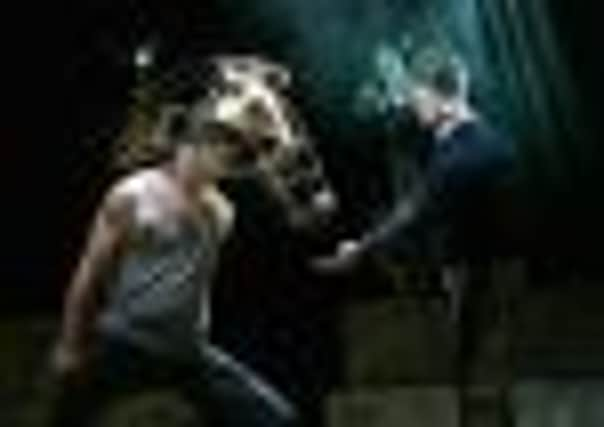Equus (review)


Coming from the stable of Peter Shaffer you have to expect controversy but nothing prepares you for the maelstrom of emotions experienced by the final act.
The West End revival of the production caused a storm because it starred a very naked Harry Potter, Daniel Radcliffe, but the full-frontal nudity is almost incidental in this mesmerising homoerotic drama.
Advertisement
Hide AdAdvertisement
Hide AdShaffer took the story-line from a true tale he’d heard about a teenage boy in Suffolk who blinded six horses in a fit of rage.


He built a fictional tale around the central character, a 17-year-old lad named Alan Strang, and turned it into a detective story with psychiatrist Martin Dysart reaching into the depths of the boy’s mind to unravel the motive behind the horrific act.
Thus we have Equus, first staged in 1973 with Peter Firth in the lead, and now touring with relative newcomer Matthew Pattimore as Strang and a commanding performance from Malcolm James as Dysart.
Sharing almost equal billing, too, must be the “horses,” a quite staggering feat by the cast (principally Stuart Angell as Nugget), whose equine body language and very authentic-sounding noises (particularly the thumping of the hooves created by bare feet on the stage), masked in golden skeletal heads, are both sinister and hypnotic to watch.
Advertisement
Hide AdAdvertisement
Hide AdPattimore has a rawness and vulnerability that was just right for the troubled Strang.
The boy faced life in prison unless Dysart could find out why the tormented teenager committed the atrocity - but solving the mystery unleashed demons in the doctor’s own troubled and deeply unsatisfactory life.
The story was told through a series of flash-backs on a spartan stage that resembled a temple or altar.
The aggressive and uncomprehending Strang was introduced, spewing out TV jingles and sporadic venom about a repressed and lonely upbringing. Dysart, equally combatant, charged with bringing peace to the boy by dragging sound-bites of his life out into the open for greater comprehension.
Advertisement
Hide AdAdvertisement
Hide AdWe meet his warring parents, a religious zealot school-teacher mother, filling her son’s head with biblical diatribe, and his atheist, working class dad, a printer by trade and book lover by passion, who eschews the television and ridicules his wife’s obsession with god. It’s no wonder the lad is confused.
There’s also the stable girl, Jill Mason (Helen Phillips in a confident cameo), whose attempts to get Strang into the hay act as a catalyst for the tragedy that is ultimately played out.
The final scenes when Mason and Strang were naked in the stable were gripping and had the stunned audience on the edge of their seats.
James effortlessly embodies the psychiatrist and gives a powerful performance. At times he’s almost envious of the pathological and sexual fascination Strang feels for horses, often despairing of his own soulless existence and the actor evokes both empathy for himself, and surprisingly, sympathy the boy. He goes about breaking the teenager as one would a wild mustang but ultimately both are irretrievably scarred by the experience.
This bleak but engrossing play, from a talented and committed cast, deserved a better response from theatre-goers many of who missed a superb night’s theatre.
ANNE COX